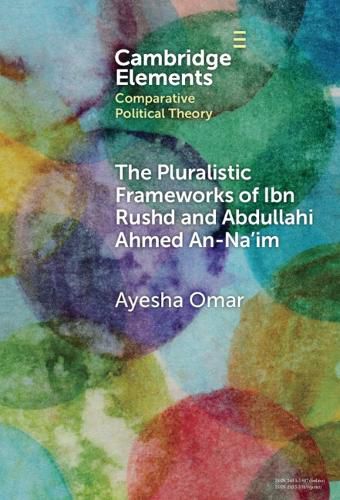Readings Newsletter
Become a Readings Member to make your shopping experience even easier.
Sign in or sign up for free!
You’re not far away from qualifying for FREE standard shipping within Australia
You’ve qualified for FREE standard shipping within Australia
The cart is loading…






The purpose of this Element is to analyse the assiduous attempts of two Islamic political thinkers-the 12th century Andalusian philosopher Ibn Rushd and the contemporary Sudanese reformist Abdullahi Ahmed An-Na'im-to theorise Islamic politics through an approach the author refers to as 'pluralistic frameworks'. A pluralistic framework, is a systematic mediation of Islamic ethics and politics that incorporates extra-Islamic traditions of thought from diverse sources. Pluralistic frameworks selectively and self-consciously enable dialogue, synthesis, and hybridity and seek to maintain a distinct conception of Islamic ethics that concords with a preferred set of political arguments. They enable reflexivity within the ethical purview of Islam and with an awareness of the normativity of shari'a.Both Ibn Rushd and An-Na'im reconcile shari'a in two very different ways, but to a common end; Ibn Rushd lays out a method of harmonisation with Greek thought, while An-Na'im resorts to the radical subversion of sharia under liberal thought.
$9.00 standard shipping within Australia
FREE standard shipping within Australia for orders over $100.00
Express & International shipping calculated at checkout
The purpose of this Element is to analyse the assiduous attempts of two Islamic political thinkers-the 12th century Andalusian philosopher Ibn Rushd and the contemporary Sudanese reformist Abdullahi Ahmed An-Na'im-to theorise Islamic politics through an approach the author refers to as 'pluralistic frameworks'. A pluralistic framework, is a systematic mediation of Islamic ethics and politics that incorporates extra-Islamic traditions of thought from diverse sources. Pluralistic frameworks selectively and self-consciously enable dialogue, synthesis, and hybridity and seek to maintain a distinct conception of Islamic ethics that concords with a preferred set of political arguments. They enable reflexivity within the ethical purview of Islam and with an awareness of the normativity of shari'a.Both Ibn Rushd and An-Na'im reconcile shari'a in two very different ways, but to a common end; Ibn Rushd lays out a method of harmonisation with Greek thought, while An-Na'im resorts to the radical subversion of sharia under liberal thought.